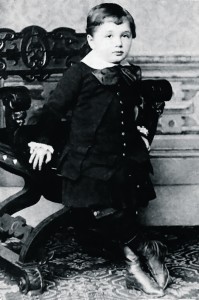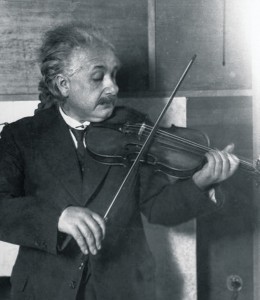SATURDAY, 29 JANUARY 2011
“My life is a simple thing that would interest no one. It is a known fact that I was born, and that is all that is necessary.”
Albert Einstein did not set out to change the world. He was just a man in awe of the Universe, who wanted to understand and explain it. Superficially, his success and legacy resulted from his Universe-shattering theories, but underneath lies an intricate interplay of his complex character with personal struggles and the turbulence of the early 20th century.
Einstein’s fascination with the physical world was unrelenting from childhood. He was just five when the movement of a compass needle set his mind in motion: “Something deeply hidden had to be behind things.”
The awe of young Einstein grew into a “rapturous amazement at the harmony of natural law,” equivalent in his mind to religiosity. To him, the idea of a personal, prayer-answering God was “naïve,” but as a Jew in the early 20th century, he was not without religious inclination. Together with his awe and reverence for the universe, this manifested itself in a secular, “cosmic religious sense” that motivated his science and carried him to success that his independent, free-thinking character may otherwise have precluded.
Einstein’s character underpinned the success of relativity. Although he was unknown in the academic world, he dared to publish, along with three other ground-breaking papers in the same year, a theory that required a “modification of the theory of space and time” and dismissed Newtonian physics. There is no better demonstration of his fearless independence of thought and disregard for received wisdom that characterised so much of his life before and after his success.
His natural individualism was augmented by early experiences. Already a lonesome child, Einstein’s isolation was reinforced by attending a Catholic school as a Jew. This nurtured his tendency to rebel and trust only himself, an attitude cemented in his mind by religious disillusionment. As a schoolboy, he observed Jewish strictures, but also read much science. When he realised, through his scientific studies, that much of the Bible could not be true, he vehemently rejected religion. “Youth is intentionally being deceived by the state,” he explained in later life, “Suspicion against every kind of authority grew out of this experience.”
Einstein’s dissident approach caused him difficulty at every stage of his education. He thought the teaching at his school obstructed creative thinking, and that rote drills and questioning in class accustomed the pupils to military-style “mechanical discipline.” After leaving school early, through a mixture of his own disquiet and his teachers’ irritation, he required extra studies to gain his place at the Zurich Polytechnic. Once there, he continued to please himself; he often missed physics practical classes, and even when there, he often carried out the experiment as he thought best.
On graduating, Einstein struggled to get an academic job. No-one would provide him with a good reference, and his teaching style was considered unacceptable—he did not teach facts, but encouraged independent thinking, an approach that later made him a popular lecturer. Again, his character had created a stumbling block, but one that may ultimately have led to his success.
When Einstein did find a job, it was not as an academic. He became a patent examiner, a job that suited his imagination and critical mind. Importantly, it allowed him to continue with his own thought experiments in his own time. This freedom was exactly what he craved. Without the restrictions of academia, his free thinking and rejection of received wisdom thrived, and he could comfortably ignore Newton and the physics establishment to follow his own train of thought and turn physics on its head.
Einstein’s cosmic religious sense could also lift him above the “merely personal” and when he struggled with the emotional side of life, science was his haven. This became clear when he separated from his first wife and faced the prospect of little contact with his sons. “No wonder that the love of science thrives under these circumstances,” he said, “for it lifts me impersonally, and without railing and wailing, from the vale of tears into peaceful spheres.” During the throes of this intense personal struggle, he perfected and published the most important theory in physics: general relativity.
Despite this apparent coldness and a necessity for solitude, Einstein’s relationships reveal an emotional and sometimes passionate man. While at Zurich, he fell in love with Mileva Mariç, a fellow student who later became his first wife. Their relationship was founded on a shared passion for physics; they read together and discussed science in their letters. Yet underneath, there was a deeper connection: “Without you I have no self-confidence, no passion for work, no enjoyment of life—in short, my life is a void.” They had two sons, with whom Einstein’s relationship fluctuated. But their marriage broke down and when Mariç moved away with their children, he was reduced to tears that betrayed his true attachment to them. “The thought of leaving the children stabbed me like a dagger every morning when I awoke.”
Einstein married again, to his cousin Elsa, a relationship that caused the split with Mariç. Although he stayed with Elsa until her death, his infidelity continued with a string of illicit relationships that reveal his often unmentioned magnetism and appeal to women.
More subtle glimpses beneath the detached façade hint at Einstein’s depth. He was a talented violinist, often playing with others, and even celebrated his theory of general relativity by buying a new violin. As an old man, he endeared his neighbours with recitals and serenades. He helped children with their schoolwork and displayed an eccentric wit. Once, while in a convertible as it began to rain, Einstein removed his hat, put it under his coat and turned to his puzzled companion: “You see, my hair has withstood water many times before,” he said, “but I don’t know how many times my hat can.”
After general relativity was published and proved by the observation of deflected light, Einstein’s life changed forever. He became a celebrity across the globe. As a largely solitary man, the constant demand for his attention annoyed him, yet he did not avoid it and, as he became used to it, even relished it.
His eminence, however, made him a target for the growing anti-Semitism in Germany between the wars. His work was attacked and his unorthodox thinking and radical theories used to exemplify the ‘menace’ of Jews. Although he had no interest in the religion itself, he embraced his Jewish heritage and spoke out in defence of the community. But after the assassination of Walther Rathenau, a Jewish friend in the German government, Einstein knew he was no longer safe in Germany.
He fled, ultimately settling in America, having felt at home on previous visits. He appreciated the tolerance for creativity and free speech, a great contrast to Germany. He used this liberty and his public identity to advocate pacifism and call for an international authority to govern military power. He became a US citizen, his fourth change of citizenship, but his allegiance to his adopted state left an eternal blemish on the world.
Physicist Leó Szilárd, a friend of Einstein, told him of the potential for uranium to produce powerful explosives. In 1939, just after the outbreak of war in Europe and as America began to rearm, Einstein wrote to President Roosevelt warning him of a possible nuclear threat from the Nazis. His letter triggered the Manhattan Project.
Although Einstein’s action appeared to contradict his pacifism, he stuck by his principles. He no longer considered pacifism a viable stance in the face of the Nazi threat, and approved nuclear weapons as a justified defence. But once it was clear that Germany had no such weapons, he opposed continuation of the project and condemned the use of the bomb. Later on, he made this clear: “Had I known that the Germans would not succeed in producing an atomic bomb, I never would have lifted a finger.”
After the war, Einstein used the nuclear threat to bolster his argument for an international authority. He became the chairman of the newly formed Emergency Committee of Atomic Scientists, dedicated to the control of nuclear weapons. Although Einstein was considered naïve in his ideals and politics, he was now motivated not only by pacifism, but also, according to his own admission, by guilt. He dedicated the last years of his life to this cause.
Since his death, studies of Einstein’s brain have not fully revealed the secret of his genius. But looking behind the science, it is clear that he was simply a man, albeit one who was captivated by the ways of the world and fearless in voicing his own observations, be it the scientific, the political, the social or the philosophical. He was cremated on the afternoon of his death, with only 12 people at his funeral. His ashes were scattered before news of his death reached the world. These modest final wishes were a poignant conclusion to the life of the very humble and very human man who changed the world.
Ian Fyfe is a PhD student in the Department of Pharmacology



